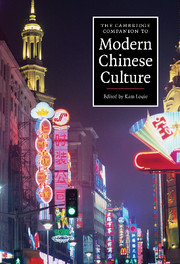Book contents
- Frontmatter
- 1 Defining modern Chinese culture
- 2 Social and political developments: the making of the twentieth-century Chinese state
- 3 Historical consciousness and national identity
- 4 Gender in modern Chinese culture
- 5 Ethnicity and Chinese identity: ethnographic insight and political positioning
- 6 Flag, flame and embers: diaspora cultures
- 7 Modernizing Confucianism and ‘new Confucianism’
- 8 Socialism in China: a historical overview
- 9 Chinese religious traditions from 1900-2005: an overview
- 10 Languages in a modernizing China
- 11 The revolutionary tradition in modern Chinese literature
- 12 The involutionary tradition in modern Chinese literature
- 13 Music and performing arts: tradition, reform and political and social relevance
- 14 Revolutions in vision: Chinese art and the experience of modernity
- 15 Cinema: from foreign import to global brand
- 16 Media boom and cyber culture: television and the Internet in China
- 17 Physical culture, sports and the Olympics
- Appendix
- Index
11 - The revolutionary tradition in modern Chinese literature
Published online by Cambridge University Press: 28 May 2009
- Frontmatter
- 1 Defining modern Chinese culture
- 2 Social and political developments: the making of the twentieth-century Chinese state
- 3 Historical consciousness and national identity
- 4 Gender in modern Chinese culture
- 5 Ethnicity and Chinese identity: ethnographic insight and political positioning
- 6 Flag, flame and embers: diaspora cultures
- 7 Modernizing Confucianism and ‘new Confucianism’
- 8 Socialism in China: a historical overview
- 9 Chinese religious traditions from 1900-2005: an overview
- 10 Languages in a modernizing China
- 11 The revolutionary tradition in modern Chinese literature
- 12 The involutionary tradition in modern Chinese literature
- 13 Music and performing arts: tradition, reform and political and social relevance
- 14 Revolutions in vision: Chinese art and the experience of modernity
- 15 Cinema: from foreign import to global brand
- 16 Media boom and cyber culture: television and the Internet in China
- 17 Physical culture, sports and the Olympics
- Appendix
- Index
Summary
This Companion provides the opportunity to devote equal attention to modern China's revolutionary and involutionary traditions. Involutionary (inward-looking) literary practices such as modernism, popular fiction and pastoral nativism are often defined in opposition to a simplistic, monolithic conception of revolutionary literature. Here we have a chance to instead explore the complexities of the revolutionary tradition in Chinese literary history. However inflated the place of revolutionary literature may be in standard Mainland literary histories, and no matter how self-important leftist writers and critics may have been, the social realist and critical realist approaches in fiction, drama and film, and the rhetoric of revolutionary romantic fervour in poetry and music had a central shaping influence on the development of modern Chinese literature. Change is the defining feature/theme of all of the significant types of literary creativity in modern China. The wide spectrum of modern literary impulses in China, including the vernacularization of writing, anti-traditionalism in ideology, the depiction of modes of consciousness or lifestyles never written about before, the investigation of social problems in the field (sometimes involving the author's participation), the desire to transform the consciousness of the reader, to devote literary creativity to fulfilling political aims, or to completely reject political aims - all this grand variety of literary difference boils down to the impetus to create something new, and is the heart of modernity in Chinese literature.
- Type
- Chapter
- Information
- The Cambridge Companion to Modern Chinese Culture , pp. 218 - 234Publisher: Cambridge University PressPrint publication year: 2008



